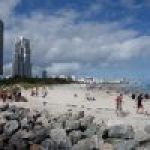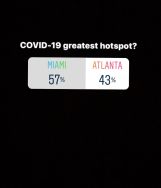COVID-19 may have slowed down summer plans but certainly not for this younger generation.
The virus spread through China to Europe to the United States to the islands early January faster than government officials could know what was even happening.
The first case of coronavirus discovered in China late December did not cause government officials to take matters into their hands as soon as possible. Now thousands of people have died in the first three months of 2020.
When the matter was finally taken seriously everything – schools, small stores and workplaces – were shut down. Soon it was mandatory to wear face masks. No one can enter a place without a mask or some type of face covering that covers their nose and mouth. It felt like the beginning of a horror movie to some.
Many workers lost their jobs. Students were kicked off campus. Shortages of water, toilet paper and cleaning supplies were quickly snatched from the aisles.

Miami, Atlanta, Puerto Rico, Mexico, Jamaica and any vacation places they can think of are what Generation Z have been traveling to this summer. Most of these places like Miami and Atlanta are hot spot areas, but no one seems to care about the risks, only the “perks.”
The risk is death, but the younger generation seems to not care or have their priorities in check.
“I do think it’s safe to travel to some places with no hotspots,” Siani Ross, freshman business major, said. “I wouldn’t travel during this time because I don’t think it’s necessary.”
“I feel like it’s not safe to travel, but personally I am going to travel anyway because you only live once,” Morris Howard, an art major, said.
Many students and the younger generation feel this way. They are bent on the idea of living their best life. Students are traveling more lately due to cheap flights and unemployment.

Miami is every college student’s vacation spot spring and summer breaks.
March, April, May, June and July spring breakers flooded Miami beach and south drive. The beach was closed many times since COVID-19. The restrictions limited how many people were allowed in restaurants and no gatherings over 10 people. There was also a 10 p.m. curfew and if you were out past curfew you would be fined, but it still did not help the thousands of people that have already caught it. Then they walk onto the airplanes to their homes spreading the virus.
Students say the transportation systems need to take more precautions, especially airplanes since those are what people are traveling more on these days.
“Still, the pandemic is far from over: The safest place you can be is at home, and for months, public health experts have recommended limiting your social interactions and staying in as much as possible, since there’s still active community spread of the virus in many areas,” Terry Nguyen, a Vox journalist, said.



